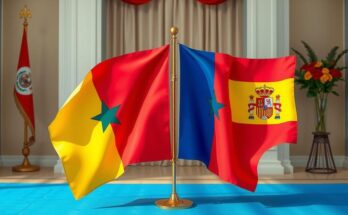The article discusses the impactful legacy of Grenada’s revolution led by Maurice Bishop, highlighting its advancements in social justice, economy, and regional diplomacy during its 55-month period. The revolution marked a significant moment in Caribbean history, fostering solidarity and anti-colonial sentiments, and laid the groundwork for collaborative relationships with countries like Cuba. Bishop’s legacy continues to inspire Grenada’s identity today.
Grenada, a small Caribbean nation, achieved significant advancements during its 55-month revolutionary period, improving the lives of its approximately 100,000 citizens while benefiting other Caribbean nations. The leader of this movement, influenced by history, politics, and experiences of racial discrimination in Great Britain, envisioned a more equitable society for Grenada. He identified the historical figure Julien Fedon as a National Hero, challenging negative representations by British historians.
Empowered by the climate of Pan-Africanism and inspired by revolutionary efforts in the region, this leader, along with peers, organized resistance against the oppressive Eric Gairy regime. The New Jewel Movement began as a coalition of political activists, evolving into various forms of organized resistance culminating in significant public uprisings against the regime in the early 1970s. Notable events, such as “Bloody Sunday” in November 1973, marked the regime’s violent crackdown on dissent.
The repressive conditions under Gairy’s regime were exacerbated by his collaboration with other authoritarian governments. Faced with rampant electoral fraud and civil rights abuses, the New Jewel Movement orchestrated a successful coup on March 13, 1979, dubbed “Operation Apple,” effectively toppling the regime. Their victory galvanized support from the local populace and spread joy across the Caribbean diaspora, marking Grenada as a beacon of revolutionary spirit akin to the Cuban Revolution.
The revolution not only stimulated regional solidarity but also catalyzed diplomatic relationships. Countries like Guyana and Jamaica began establishing relations with Cuba, affirming a renewed spirit of independence and regional unity. The revolution ultimately inspired broader movements against colonial influences in the 1970s Caribbean, establishing Grenada as a transformative force in the region.
Once in power, the new government focused on reform, encompassing health, education, and agriculture initiatives neglected by prior leadership. Participation in community councils allowed citizens to gain significant democratic rights, further enhancing public engagement. One of the government’s major accomplishments was the construction of Maurice Bishop International Airport, regarded as a pivotal infrastructure project to spur economic growth and tourism.
The close collaboration between Grenada and Cuba during this period was marked by shared projects and health initiatives, fostering a strong bilateral relationship. Grenadian Prime Minister Dickon Mitchell has reinforced these ties in recent diplomatic visits to Cuba, highlighting the enduring friendship between Grenada and the Cuban leadership. In 2024, Grenada will commemorate “National Heroes’ Day” to honor those who sacrificed their lives during pivotal events, emphasizing Maurice Bishop’s enduring legacy and defiance against larger powers.
Bishop’s firm stance and altruism serve as a powerful reminder that even the smallest nations can assert their sovereignty on the global stage, inspiring generations to uphold the values of freedom and independence. His legacy continues to influence Grenada’s identity and resolve in contemporary geopolitics.
In summary, Grenada’s revolutionary legacy exemplifies the power of grassroots movements to incite significant change, impacting not only its citizens but also the broader Caribbean region. The New Jewel Movement’s triumph marked an important moment in advocating for independence and socio-economic reform. The ongoing collaboration between Grenada and Cuba serves as a lasting testament to their shared ideals of solidarity and empowerment. Maurice Bishop’s contributions and courage remain vital to Grenada’s national identity and its assertiveness on the global stage.
Original Source: www.plenglish.com




